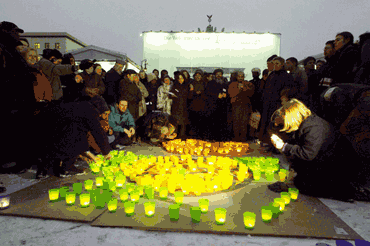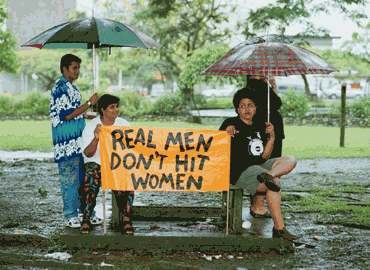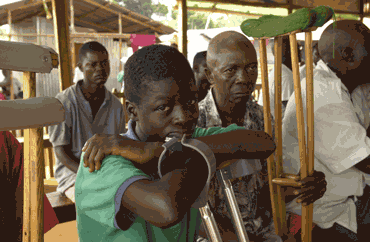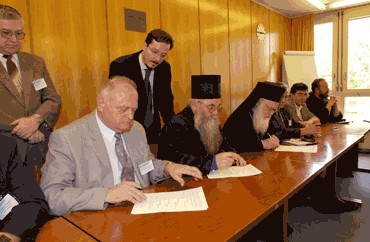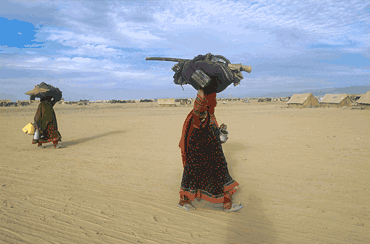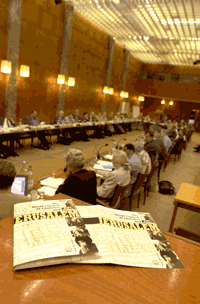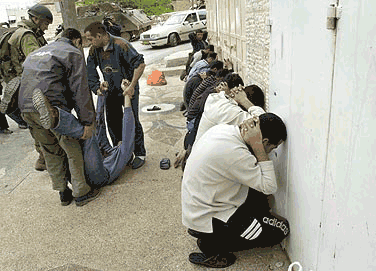
"For us, the Decade journey must start with repentance for the violence that Christians and churches have tolerated or even justified. We are not yet the credible messengers of non-violence that the gospel calls us to be." Konrad Raiser at Decade to Overcome Violence launch in Berlin (Brandenburg Gate), 4 February 2001 Press release "The churches are well placed to acknowledge and testify to the impact of small arms, since they minister to the victims and their families all around the world, in rich and poor nations. Churches see people's needs and are in a unique position to address the small arms epidemic, identifying its material, moral, ethical and spiritual dimensions. Churches can inform, mobilize and guide the community, offering a specific and holistic contribution to the international small arms campaign. Churches also have a policy role to play, bringing theological insights and moral and ethical perspectives to bear upon the social and political pursuit of small arms control and demand reduction." Policy Framework and Guidelines on Small Arms and Light Weapons, adopted at the 44th meeting of CCIA/WCC, May 2001 More Information "From the perspective of faith, the security of all is judged by the shalom security of the poorest, the weakest, the excluded, the subjugated, the minjung... The plumbline of people's security is abundant life for 'the least of these' in a globalized world economy afflicted by extreme poverty, disease, injustice, environmental degradation and militarized hegemony." Report from a February/March 2001 ecumenical consultation on justice, peace and people's security in Northeast Asia organized by WCC/CCIA (Commission of the Churches on International Affairs). Press release "The terrorist attacks have compelled... discussion on how security for the North has been made a global concern. In light of the legacies of the past millennium, we also need to interpret the implications from the perspective of the South." Deenabandhu Manchala at the Tanzania DOV festival, October 2001 Press release "Violence is evil. Yet for some, living under conditions of injustice and oppression, where all means of non-violent actions are used up, violence remains an unavoidable alternative, a last resort." His Holiness Catholicos Aram I, report to central committee, 29 January 2001 Press release "Recognizing the increasing violence in our societies and particularly the violence against women, we call on the churches to denounce the various forms of violence, culturally sanctioned or not, against women inside and outside the church. We call on the church to declare that violence against women is a sin. We urge them to take the side of the victim instead of protecting the aggressor, and to offer pastoral counselling that targets a concrete improvement in the survivor's life situation instead of simply preaching patience, silence and submission." From a statement entitled "Women's Challenges into the 21st Century", issued by the Decade Festival preceding the 8th assembly, December 1998 More information "How much do we want the issues raised from 11 September to determine our agenda in the future? For instance, should we put the priority on looking at violence, and if so, how should we approach it to engage in a real dialogue between the faiths?" Tarek Mitri, before the Christian-Muslim dialogue seminar, held in Cairo, Egypt, December 2001 Press release "... we need to reflect on religion and violence, knowing very well that violence is not grounded in religious texts but in the history of people who interpret those texts. Therefore the discussion on violence needs to be a discussion on the history of violence, and it should not start from the assumption that it is religious tradition that legitimates violence." Tarek Mitri, after a Christian-Muslim dialogue seminar held in Cairo, Egypt, December 2001 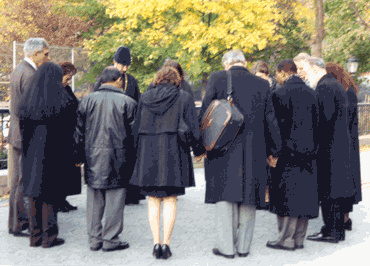 An international delegation representing "living letters" of support from the world church bow in prayer at Ground Zero, the former site of the World Trade Center in New York City "Words of condemnation and the language of 'war' come so quickly to the fore. Blame is easily assigned to 'the enemy'... It is far more difficult to regard ourselves in the mirror of such hatred, and to have the courage to recognize how deeply violence is rooted within ourselves, our communities and even our churches. These are lessons we are all trying to learn in the Decade to Overcome Violence." Konrad Raiser in his 20 September 2001 pastoral letter to WCC member churches in the USA Press release "As long as the cries of those who are humiliated by unremitting injustice, by the systematic deprivation of their rights as persons and by the arrogance of power based on military might are ignored or neglected, terrorism will not be overcome. The answer is to be found in redressing the wrongs that breed violence between and within nations." Konrad Raiser in his 16 November 2001 letter to the heads of Muslim religious communities throughout the world at the beginning of Ramadan Press release "The answer to terrorism, however, cannot be to respond in kind, for this can lead only to more violence and terror. Instead, a concerted effort of all nations is needed to remove any possible justification for such acts." Konrad Raiser, in his 2 October 2001 letter to UN secretary-general Kofi Annan Press release "Making peace requires greater courage than going to war." Bishop Riah Abu El-Assal of the Episcopal Church in Jerusalem and the Middle East, at an August 2001 consultation on the Israeli-Palestinian issue convened by the WCC Press release |
YEARBOOK 2002: CHURCHES SEEKING PEACE AND RECONCILIATION In early 2001, the central committee of the World Council of Churches (WCC) met in Potsdam, Germany, to review and direct the activities of the Council. A key feature of the Potsdam meeting was the launch in nearby Berlin of the WCC's "Decade to Overcome Violence: Churches Seeking Reconciliation and Peace" (DOV). Running from 2001 through 2010, the decade will serve as a "rallying framework" for the ecumenical commitment to the justice, peace and creation (JPC) process, according to Konrad Raiser, general secretary of the WCC. In a year-end interview, Raiser observed that groups outside the WCC as well as participating communions have expressed interest in this special emphasis and "have seized on particular facets of the Decade" as a focus for work within their own spheres of influence and social realities. In October, the team working with WCC programmes on women, youth and justice, peace and creation, together with their advisory groups, met at a Lutheran conference centre in Moshi, Tanzania, to consider ways they could bring all aspects of their programmes to the task of overcoming violence. Through the year 2001, DOV became a focal point for other events and programmes. WCC member churches in various parts of the world organized their own events to highlight the launch of the Decade to Overcome Violence.
In the central 's discussion of the Decade's implications, Catholicos Aram I of the Armenian Apostolic Church (Cilicia), moderator of the central committee, raised the question of whether Christians engaged in a struggle for justice and human rights could legitimately resort to violence as a last resort. This ethical question has become and remains a crucial subject for debate within the context of DOV. In the central committee's discussion of the Decade's implications, Catholicos Aram I of the Armenian Apostolic Church (Cilicia), moderator of the central committee, raised the question of whether Christians engaged in a struggle for justice and human rights could legitimately resort to violence as a last resort. This ethical question has become and remains a crucial subject for debate within the context of DOV. According to Aruna Gnanadason, the WCC's approach to overcoming violence grew out of its previous decade-long emphasis. At the end of the Decade of Churches in Solidarity with Women, commemorated by a celebration prior to the WCC's eighth assembly in Harare, Zimbabwe, in December 1998, many people voiced concern that "we had not moved very far in dealing with violence against women", observed Gnanadason, the coordinator of the Justice, Peace and Creation team of the WCC. The new decade, DOV, provides an opportunity to address that issue at a new level and "more pro-actively", she said. Women representing many world communions, including churches that do not formally belong to the Council's fellowship, expressed appreciation for a WCC-sponsored meeting on this theme convened in Scotland during August 2001.
Reconciliation and peace in particular regions During the Potsdam meeting, the central committee held one plenary session on Europe addressing church involvements in the cold-war years. According to Alexander Belopopsky of the Regional Relations team of the WCC, much remains unresolved in the assessment of the WCC's record in relation to that era and region. "Some feel that the WCC did not take human-rights abuses in that region seriously in the way that it took apartheid and Latin American dictatorships seriously," he said. The central committee plenary made a fresh effort to look at some of these matters. In April 2001, the WCC joined other agencies in sponsoring a consultation in which Christian and Muslim leaders of Guinea, Liberia and Sierra Leone discussed ways of resolving the conflicts in their region. Held in Freetown, Sierra Leone, the consultation called for a joint meeting of the heads of state of the three countries to deal with conflicts, border stabilization and the needs of refugees and displaced persons.
Among other actions for peace, the WCC sponsored a consultation in Kyoto, Japan, at the end of February and beginning of March on justice, peace and people's security in Northeast Asia. Dwain Epps, coordinator of the International Relations team of the WCC, described it as the first time since the Maoist revolution that representatives of the church in China and of the church in Taiwan sat together in a substantive meeting on Asian concerns. "Although they could not agree on a statement, neither walked out," Epps said.
In cooperation with the Lutheran World Federation, the WCC held a September consultation in Geneva on Colombia; participants called for resolution of conflict there through peaceful dialogue, and they opposed the military support given to the Colombian government by the United States. In June, danger of an emerging conflict between Albanians and Slavs in the Former Yugoslav Republic of Macedonia was addressed in an inter-religious consultation sponsored by the WCC in Morges, Switzerland. A meeting in Indonesia brought together youth from several countries experiencing conflict related to religion, and initiated a three-year project on peace-building. WCC general secretary Raiser visited southern Africa in August for discussions on church responses to HIV/AIDS and attempts to end conflict in the region, particularly the civil war in Angola. 11 September and its consequences In terrifying testimony to the timeliness of the Decade to Overcome Violence, the year of its launch was soon marred by devastating attacks on the World Trade Center in New York and the Pentagon in Washington, DC. The WCC executive committee was meeting in Geneva at the time the attacks occurred on 11 September 2001, and participants immediately began considering how the churches should respond. Writing on behalf of the executive committee, the general secretary sent a message to American churches the day of the attack, and this was followed by a pastoral letter on 20 September. As the executive committee met, plans emerged for a visit to the USA of "living letters" to communicate personally the Council's concern for and solidarity with the people of the USA. This delegation from churches of other countries visited the United States 8-14 November 2001, going to New York, Washington and Chicago to share in the shock and sorrow of those communities. They concluded the visit with participation in the annual meeting of the National Council of Churches of Christ in the USA as representatives of those churches gathered in Oakland, California. In the aftermath of the 11 September attacks, the WCC considered other kinds of responses it might make to the dramatic manifestations of violence that confronted humanity. "The WCC has expertise in the areas and issues which were raised after 11 " reflected Georges Lemopoulos, the WCC's deputy general secretary. The WCC questioned how it might counteract any impression that the extremists who took so many lives in New York and Washington were representative of Islam as a whole, and how the WCC might act to prevent deterioration in Christian-Muslim relations. At the beginning of Ramadan, Raiser issued an open letter expressing the spiritual solidarity of all believers. Tarek Mitri, coordinator of the WCC team for Inter-Religious Relations and Dialogue, found that a document on dialogue produced before 11 September became even more relevant afterwards, particularly in its call for "de-globalization" of Christian-Muslim tensions. In October, the WCC joined with the Vatican's Pontifical Council for Interreligious Dialogue and with Muslim leaders for a conference in Cairo, Egypt. This was followed, in Cairo and elsewhere, by a proliferation of inter-religious conferences promoting dialogue for the sake of understanding and peace. For Afghanistan, the repercussions of 11 September and the ensuing "war on terror" resulted in a more urgent need for humanitarian aid. The WCC responded with its ecumenical partners through ACT International (Action by Churches Together) which had been operating in the country long before the events of 2001. By the end of the year, ACT was mobilizing efforts to aid refugees in and around this war-torn nation.
On 8 October the WCC called for an end to military attacks on Afghanistan and set out to help alternative voices make themselves heard. It joined with ACT International and the Ecumenical Advocacy Alliance (EAA) to form a crisis response working group. Together, these agencies began sharing alternative views of the global conflict through an email and web bulletin: "Behind the News: Visions for Peace-Voices of Faith". A consultation with key church policy-makers in the field of international affairs from around the world, organized to analyze the global consequences of 11 September, was held in Geneva, 29 November-2 December 2001. This meeting was designed less to lay out a plan of ecumenical action than to discern the way forward in response to the new global challenge. Participants achieved consensus in condemning the militarization of efforts to combat terrorism. They also recognized that among the consequences of the US-led response to the attacks in New York City and Washington, DC, were their impact on the situation in the Middle East. The consultation opposed attempts to justify Israeli maltreatment of Palestinians as part of the international struggle against terrorists. The Middle East conflict Well before 11 September the WCC had taken significant steps to address the suffering of Palestinians under Israeli occupation and to build on diplomatic principles for a just and lasting peace in the region. It sent a delegation to Palestine and Israel from 27 June to 1 July in preparation for a WCC consultation in Geneva 6-7 August to coordinate an ecumenical response to the Palestinian-Israeli "Intifada II" conflict. In September, the WCC executive committee endorsed the recommendations of the consultation, calling upon the churches to "focus attention in 2002 on intensive efforts to end the illegal occupation of Palestine", to "participate in an international boycott" directed at "goods produced in the illegal Israeli settlements in the occupied territories", and directing the WCC to develop an "accompaniment programme" to send ecumenical representatives to share the trials of the Palestinians in the midst of the crisis. The establishment of the Ecumenical Accompaniment Programme in Palestine and Israel (EAPPI) was announced on 29 October 2001.
According to Dwain Epps, these decisions reflected a significant shift in ecumenical policy. Some of the WCC's member churches had already modified their stance on the Middle East conflict in 2001 in response to the Israeli government's massive armed attacks in the Palestinian territories. Whereas many churches had previously insisted that any WCC statements on the Palestinian-Israeli conflict be balanced to take into account Israelis' concerns about their own security, by the time of the central committee meeting in early 2001, representatives of several of these same churches called for firm condemnation of Israeli behaviour. Although they continued to condemn violence perpetrated by either side, they insisted that Israel's use of disproportionate force in defending an illegal occupation of Palestinian lands was the primary act of violence and had to be condemned. Hans Ucko from the Inter-Religious Relations and Dialogue team of the WCC noted that the Jewish-Christian dialogue, like any other programme of the WCC, seeks to promote peace and justice. It therefore supports Jewish voices in Israel calling for people of good will to work towards these goals in the Israeli-Palestinian conflict. It is important that the peace movement in Israel be strengthened, Ucko said. In cooperation with the International Jewish Committee on Interreligious Consultations (IJCIC), the WCC's team sponsored a consultation in Yaoundé, Cameroon, in November 2001, bringing together French-speaking African Christians and Jews. The first event of its kind, this consultation looked at the experiences and memories of violence in such events as the Shoah (Holocaust) and the Rwanda genocide, seeking to discern how the Hebrew word for peace, shalom, and the African concept of ubuntu, good relations, could be used in peace-building. |
|||
